Introduction – Why Look Back to the Early Church?
When conversations about the end times come up, people often focus on prophecy charts, global events, or the latest headlines about wars, disasters, or political turmoil. While Scripture certainly gives us signs to watch for, sometimes the most powerful guidance doesn’t come from looking ahead, but from looking back.
The first-century church, described in the book of Acts and the letters of Paul, lived in a world that mirrors much of what believers are sensing today. They faced persecution from authorities, economic hardship, and cultural hostility toward the gospel. For them, following Jesus often meant losing their livelihood, their freedom, or even their lives. Yet despite this pressure, they didn’t crumble—they flourished.
Instead of hiding, they prayed for boldness. Instead of hoarding, they shared generously. Instead of giving in to fear, they fixed their eyes on Christ’s return and lived with a daily urgency that shaped everything they did. Their faith wasn’t abstract—it was lived out in real hardship, and it left a testimony that continues to challenge us centuries later.
This is why their story matters for us today. If we want to know how to live in uncertain times—how to stay faithful when culture shifts against us, how to endure hardship with joy, and how to remain steadfast in hope—we need only look to the early church. Their resilience, unity, and devotion to Christ provide a blueprint for believers navigating the turbulence of our own age.
As Hebrews 12:1 reminds us: “Since we are surrounded by such a great cloud of witnesses, let us throw off everything that hinders and the sin that so easily entangles. And let us run with perseverance the race marked out for us.” The early Christians are part of that great cloud of witnesses, and their example still speaks loudly to us today.
In the pages that follow, we’ll explore five key lessons from the early church—lessons that can help us live faithfully, courageously, and joyfully as we prepare for the return of Christ.
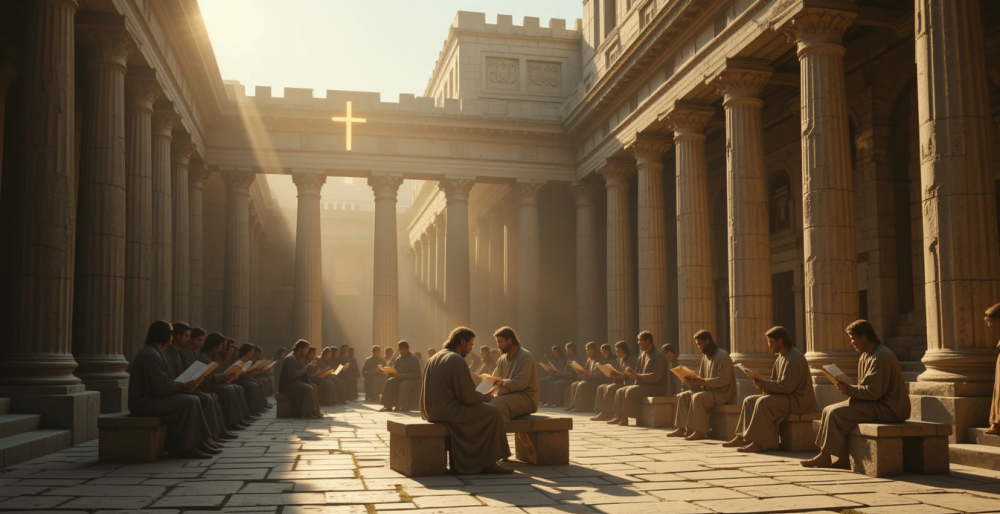
Lesson One: Bold Faith in the Face of Opposition
From the very beginning, the disciples of Jesus were not welcomed with open arms. They faced threats, prison, and even death simply for proclaiming that Jesus was the risen Lord. In Acts 4, after Peter and John healed a man in the name of Jesus, the religious leaders were outraged. They commanded them not to speak or teach in the name of Christ again. For many, that kind of pressure would be enough to go silent. But the early church responded differently.
Instead of retreating, they gathered together and prayed:
“Now, Lord, consider their threats and enable your servants to speak your word with great boldness” (Acts 4:29).
They didn’t ask God to remove the threats. They didn’t pray for safety or comfort. They prayed for courage. And God answered:
“After they prayed, the place where they were meeting was shaken. And they were all filled with the Holy Spirit and spoke the word of God boldly” (Acts 4:31).
This scene captures the heartbeat of the early church. They understood that obedience to Christ would bring opposition, but they also knew that the Spirit who lived within them was greater than any power in the world. Boldness became their hallmark.
Historical Context
In the Roman world, refusing to worship the emperor or participate in pagan rituals was considered treasonous. Christians were accused of being atheists, cannibals (misunderstanding the Lord’s Supper), and enemies of the state. For standing firm, many were imprisoned, beaten, or executed. Yet Christianity didn’t die out under persecution—it exploded. The blood of the martyrs became the seed of the church. Their bold faith inspired others to believe.
Takeaway for Today
End-times living requires the same kind of courage. The pressure to compromise truth for comfort is strong in our generation. We live in a world that often calls evil good and good evil (Isaiah 5:20). Standing for biblical truth may cost us friendships, jobs, or social acceptance. In some parts of the world today, it can even cost your freedom or your life.
The temptation is to stay quiet, to blend in, or to soften the message of the gospel so that it feels less offensive. But just like the early church, we are called to pray for boldness. Boldness doesn’t mean arrogance. It doesn’t mean shouting down others or being reckless. True boldness comes from the Spirit and is rooted in love and truth.
Paul reminded Timothy: “For the Spirit God gave us does not make us timid, but gives us power, love and self-discipline” (2 Timothy 1:7). That same Spirit lives in us today.
“A recent example that echoes the early church’s courage is the life (and death) of Charlie Kirk. In his final days, Kirk was widely known for speaking boldly in public squares, campuses, and online platforms—even when he faced harsh criticism and ideological opposition. Regardless of one’s political stance, it’s undeniable that he did not shy away from controversy or silence; he held fast to his convictions, even under threat. His assassination has stirred a national dialogue about truth, courage, and the price of speaking boldly in our time. Just as the disciples in Acts asked God to ‘enable your servants to speak your word with great boldness,’ we can look to modern examples for inspiration—and reminders—of what it means to stand firm when the cost is high.”
Practical Application
- Pray for courage daily. Just as the disciples prayed in Acts 4, ask God to fill you with His Spirit and give you the words to speak when opportunities arise.
- Prepare for opposition. Expect that following Christ will sometimes cost you. Don’t be surprised when faith is mocked or resisted.
- Stand firm with gentleness. Boldness is not about being harsh—it’s about being faithful. 1 Peter 3:15 calls us to “always be prepared to give an answer… but do this with gentleness and respect.”
- Encourage one another. Just as the early believers gathered together in prayer, surround yourself with a community of faith that strengthens your courage.
Faith for the End Times
If the early church could stand boldly against the Roman Empire, we can stand boldly in our generation. The opposition may look different—social pressure, legal battles, digital censorship—but the call remains the same: proclaim Christ without fear.
The Spirit who shook that meeting room in Acts 4 still empowers believers today. He can shake our hearts with courage, shake our communities with revival, and shake the world with the unshakable truth of the gospel.
Living boldly for Christ is one of the clearest signs of readiness for His return.
Lesson Two: Radical Generosity & Sharing
One of the most striking features of the early church was its generosity. Luke records in Acts 2:44–45:
“All the believers were together and had everything in common. They sold property and possessions to give to anyone who had need.”
This radical way of living often catches modern readers by surprise. But it’s important to understand what was happening. This was not forced socialism, nor was it a government program. It was the overflow of Spirit-filled hearts. Having encountered the love of Christ, believers realized that their possessions weren’t truly their own. Everything they had came from God, and therefore, everything was available for His purposes.
Historical Context
In the Roman Empire, poverty was rampant, widows and orphans often went uncared for, and slavery was common. Yet the Christian community stood out. They created a countercultural society where the hungry were fed, the sick were tended to, and no one was left without help.
Church historian Tertullian wrote that pagans marveled at Christians, saying: “See how they love one another, and how they are ready to die for each other.” Their love and generosity weren’t theoretical; they were lived out daily in the sharing of meals, homes, and resources.
Takeaway for Today
In times of crisis, generosity will distinguish believers from the world. Stockpiles may run out, but love and unity multiply blessings. The world’s instinct in an emergency is often hoarding—grabbing as much as possible to protect oneself. But Christians are called to reflect Christ, who gave everything for us.
Preparing for your family is wise, but preparing to share is Christlike. True preparedness includes an open hand, not just a stocked pantry.
Practical Application
- Budget for Blessing: As you prepare, set aside a portion specifically for helping others—an extra case of canned goods, a spare water filter, or hygiene items you can give to a neighbor in need.
- Hospitality as Ministry: In uncertain times, opening your home for prayer, a shared meal, or fellowship can be as impactful as sharing physical supplies.
- Community Networks: Form connections with other believers so that resources, skills, and encouragement can be shared when times are tough.
- Trust God’s Multiplication: Remember the loaves and fishes (John 6). What seems small in your hands can become abundance in God’s.
Faith for the End Times
When the world is dark, generosity shines. Jesus said in Matthew 5:16: “Let your light shine before others, that they may see your good deeds and glorify your Father in heaven.” Sharing in times of scarcity doesn’t just meet physical needs—it testifies to the supernatural love of Christ.
In the end times, when fear and selfishness may run rampant, Christians have the opportunity to demonstrate a different way—the way of Christlike generosity. This not only sustains the body of Christ but also draws unbelievers to the gospel.
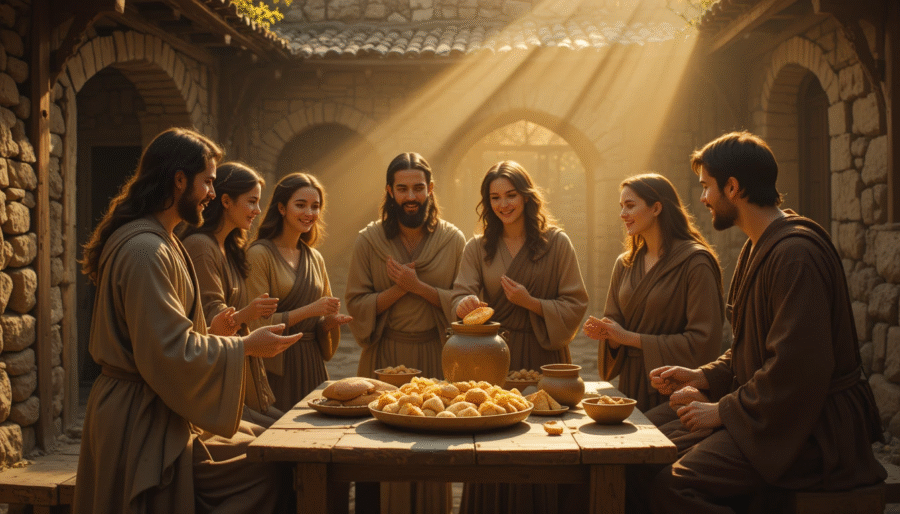
Lesson Three: Steadfast in Teaching & Prayer
When the Spirit was poured out at Pentecost, the very first mark of the church wasn’t power, miracles, or even bold preaching. Luke tells us the hallmark was devotion:
“They devoted themselves to the apostles’ teaching and to fellowship, to the breaking of bread and to prayer” (Acts 2:42).
This verse paints a picture of steady, ordinary faithfulness. The early Christians weren’t sustained by adrenaline or excitement, but by daily rhythms of teaching, fellowship, communion, and prayer. In a hostile world, these practices became the anchor that held them fast.
Why Teaching and Prayer Matter
- Teaching grounded them in truth. False philosophies, pagan practices, and persecution swirled around them. What kept the church steady was their relentless focus on the Word of God. They didn’t drift with the culture—they measured everything against Scripture.
- Prayer connected them to power. Prayer wasn’t an afterthought; it was the lifeline. They prayed in homes, in prison cells, and in public gatherings. And prayer fueled the boldness, miracles, and perseverance that defined their movement.
Historical Example
Church history tells us that believers often risked their lives just to gather. In Rome, Christians met in underground catacombs to study Scripture and pray, knowing discovery could mean death. Yet they considered fellowship and teaching worth more than safety. That kind of steadfast devotion turned a persecuted minority into a movement that eventually changed the world.
Takeaway for Today
In times of uncertainty, teaching and prayer are not optional extras. They are essential disciplines for survival and growth. End-times readiness isn’t just about stored food or escape plans—it’s about being rooted deeply in God’s Word and staying in constant communion with Him.
Practical Applications for Us:
- Stay rooted in Scripture: Make Bible reading part of your daily survival plan, not just your spiritual plan. (See also: Spiritual Readiness for the End Times.)
- Commit to prayer: Pray for courage, provision, and endurance. But also pray with thanksgiving—gratitude is a shield against fear.
- Fellowship faithfully: Don’t isolate yourself. Find or build small groups of believers who can encourage and strengthen one another.
- Guard against false teaching: The early church fought heresies from the beginning. We must do the same in our digital age of misinformation. (You may also like: Discerning False Prophets in a Digital Age.) ( Coming Soon)
Faith for the End Times
The early church shows us that the “ordinary” practices of faith are extraordinary weapons in times of trial. Teaching, fellowship, and prayer were not flashy, but they made the church unshakable.
As Paul urged the Colossians: “Let the message of Christ dwell among you richly… and whatever you do, whether in word or deed, do it all in the name of the Lord Jesus” (Colossians 3:16–17). That same devotion is what will keep us steadfast as we look toward Christ’s return.
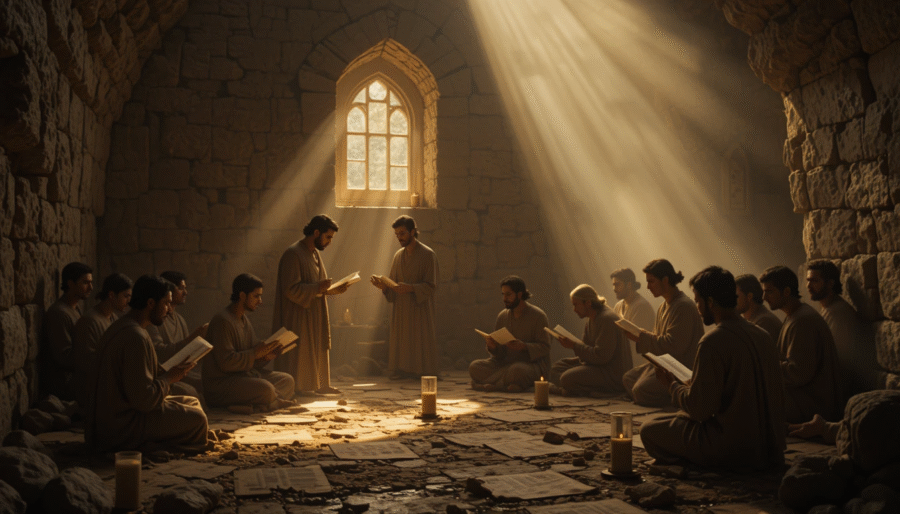
Lesson Four: Expectation of Christ’s Return
One of the most defining characteristics of the early church was their sense of urgency. They didn’t live as though life on earth was permanent or predictable. Instead, they lived every day expecting the return of Jesus. Paul wrote to the Thessalonians:
“They tell how you turned to God from idols to serve the living and true God, and to wait for his Son from heaven, whom he raised from the dead—Jesus, who rescues us from the coming wrath” (1 Thessalonians 1:9–10).
For the early believers, this wasn’t theory. It was the heartbeat of their lives. They endured persecution, loss, and hardship with joy because they knew the story wasn’t over. Christ was coming again, and His reward was with Him.
Historical Context
Roman society mocked Christians for their “superstitious” beliefs. Many could not comprehend why believers would willingly face death in arenas or lose their property for the sake of faith. What sustained them? The expectation that this life was temporary and that Jesus would soon set all things right.
This expectation shaped their priorities. Instead of hoarding wealth, they gave generously. Instead of clinging to safety, they preached boldly. Instead of despairing under suffering, they rejoiced in hope.
Takeaway for Today
In our modern age, the urgency of Christ’s return has often been dulled. Some mock the idea of the second coming altogether. Others avoid thinking about it because it makes them uncomfortable. Still others become so obsessed with date-setting and speculation that they miss the real purpose: to live holy and ready.
End-times readiness isn’t about fear or obsession—it’s about focus. Living with the expectation of Christ’s return should shape how we spend our time, money, and energy. It reminds us that our hope is not in governments, economies, or stockpiles, but in the coming King.
Practical Applications
- Live with urgency: Treat every day as a gift and an opportunity to serve Christ. (See also: Hope in Troubled Times: Fixing Eyes on Christ’s Return.)(Coming Soon)
- Hold possessions loosely: Remember that nothing in this world is permanent. Use what you have to advance the kingdom.
- Encourage one another: Paul told the Thessalonians, “Therefore encourage one another with these words” (1 Thessalonians 4:18). Speak often of Christ’s return to strengthen each other.
- Stay alert: Jesus Himself said, “Therefore keep watch, because you do not know on what day your Lord will come” (Matthew 24:42). Complacency is dangerous.
Faith for the End Times
Just as the early church endured trials with hope, we too are called to lift our eyes above the noise of this world. Wars, disasters, and persecution may shake us, but they should not surprise us. Jesus told us these things would come. What should mark us is not fear, but anticipation.
When we live as if Jesus could return at any moment, we reorder our lives around what matters most—loving God, loving people, and proclaiming the gospel. That is how the early church lived, and it’s how we must live as we wait for His appearing.
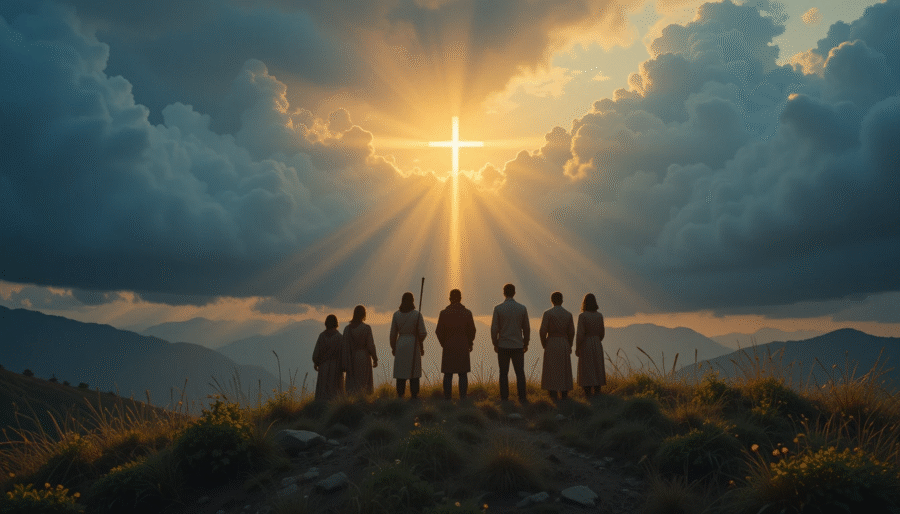
Lesson Five: Perseverance in Suffering
The early church knew suffering far better than comfort. From the moment they confessed Christ as Lord, believers often faced loss—loss of property, livelihood, family relationships, and in many cases, their very lives. Yet their testimony was not marked by despair but by perseverance.
Hebrews 10:32–34 paints the picture vividly:
“Remember those earlier days after you had received the light, when you endured in a great conflict full of suffering. Sometimes you were publicly exposed to insult and persecution; at other times you stood side by side with those who were so treated. You suffered along with those in prison and joyfully accepted the confiscation of your property, because you knew that you yourselves had better and lasting possessions.”
This is radical. They didn’t just endure suffering—they accepted it with joy. Why? Because their eyes were fixed on eternity. They believed Jesus’ promise in John 16:33: “In this world you will have trouble. But take heart! I have overcome the world.”
Historical Context
Roman emperors like Nero unleashed brutal persecution against Christians. Some were burned as human torches, others thrown to wild beasts in arenas. Yet reports from history tell us many died singing hymns or praying aloud for their executioners. Their courage was not human—it was Spirit-filled perseverance grounded in eternal hope.
This unshakable witness changed the Roman Empire. The more the church was pressed, the more it grew. The more they suffered, the more outsiders asked, “What gives them such peace and courage?” Their perseverance was one of the greatest evangelistic tools of the early centuries.
Takeaway for Today
We may not face lions in an arena, but suffering is still part of the Christian walk. Around the world, many believers are imprisoned, beaten, or even killed for their faith. In Western nations, suffering may take the form of ridicule, job loss, or legal opposition. And as the world grows darker, the pressure may increase.
End-times readiness includes preparing our hearts for trials. Perseverance doesn’t come from willpower—it comes from trusting the Spirit, remembering eternity, and walking in community with other believers.
Practical Applications
- Expect hardship: Don’t be surprised when trials come. Jesus promised we would face them. (See also: Encouraging Scriptures for Families in Crisis.)
- Rejoice in hope: Like the early church, remember that joy is rooted in Christ’s victory, not circumstances.
- Stand with others: The Hebrews passage commends those who “stood side by side” with persecuted brothers and sisters. Support, pray for, and encourage believers facing trials.
- Keep an eternal mindset: Remember Paul’s words in 2 Corinthians 4:17 — “For our light and momentary troubles are achieving for us an eternal glory that far outweighs them all.”
Faith for the End Times
The early church’s perseverance wasn’t a sign of weakness but of Spirit-empowered strength. Their willingness to suffer for Christ’s sake became proof of the gospel’s truth and power. Today, as we face our own pressures—whether ridicule, loss, or real persecution—we can draw courage from their example.
Perseverance is not about gritting our teeth and hanging on. It’s about leaning into God’s promises, drawing strength from His Spirit, and remembering that suffering produces endurance, endurance produces character, and character produces hope (Romans 5:3–4).
The church that endures with joy in suffering is a church that points the world to Christ. Just as the early believers shone in the darkness of Rome, we are called to shine in the uncertainty of our times—steadfast, unshaken, and full of hope in the return of our King.
Application for Today
Looking back at the early church, we see not just history, but a model for our own discipleship in uncertain times. Their lives remind us that end-times readiness is not about fear or speculation—it is about living faithfully in the present while fixing our eyes on eternity.
Here’s how we can take their example and live it out today:
- Pray for boldness in a culture that opposes truth. Just as the apostles asked God for courage in Acts 4, we can ask Him to strengthen us to speak truth with love, even when it’s unpopular or costly.
- Practice generosity by preparing not just for yourself, but to bless others. In a world that clings tightly to possessions, open hands stand out. Radical generosity shows the world that our treasure is in heaven, not on earth.
- Stay rooted in Scripture and prayer, keeping fellowship central. The early church survived persecution because they were grounded in God’s Word and strengthened by each other’s prayers. These same habits are what keep us steady when storms come.
- Live with urgency, knowing Christ’s return is near. The expectation of His coming gave the early church joy and purpose. That same hope should shape how we spend our time and energy today.
- Persevere with joy, remembering our eternal reward. Trials will come, but suffering is never wasted in God’s hands. As Paul wrote, our present troubles are “achieving for us an eternal glory that far outweighs them all” (2 Corinthians 4:17).
This is how the early church grew in strength—and how we can, too. By walking faithfully in these lessons, we become a church that not only survives uncertain times, but shines as a light in the darkness.
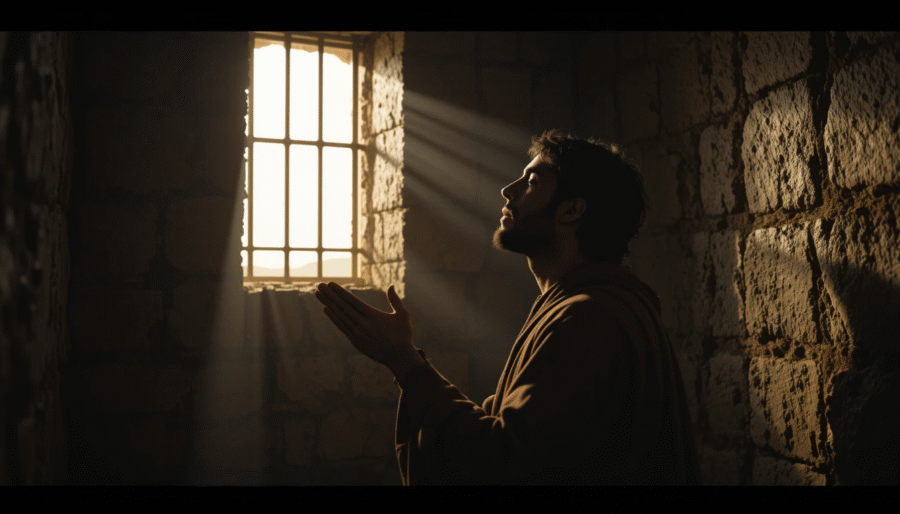
Dig Deeper: Faith & End-Times Readiness
The lessons of the early church are a powerful guide for us today. If you’d like to explore these themes further, here are some resources on Prepared & Redeemed that connect directly to this message:
- 📖 Spiritual Readiness for the End Times — A reminder that stockpiles alone won’t sustain us; true preparation starts in the heart.
- 🙏 Encouraging Scriptures for Families in Crisis — God’s promises that bring peace when fear and uncertainty rise.
- 🛠️ 12 Essential Survival Items Every Christian Home Should Have — Practical steps to build a foundation of preparedness while trusting God.
- 🤝 Why Spiritual Prepping Matters More Than Stockpiles — A closer look at why unity and fellowship will be critical in the last days.
💡 Each of these articles builds on the example of the early church and shows how spiritual faithfulness and practical readiness go hand in hand
A Call to Salvation
The early church wasn’t powerful because of their own strength—it was powerful because their lives had been transformed by Jesus Christ. The same transformation is available to you today.
Jesus said: “Whoever believes in me, as Scripture has said, rivers of living water will flow from within them” (John 7:38). No amount of preparation can secure eternal life—only Christ can.
If you have never placed your trust in Him, don’t wait. Admit your sin, believe that Jesus died and rose again, and confess Him as Lord. Romans 10:9 promises: “If you declare with your mouth, ‘Jesus is Lord,’ and believe in your heart that God raised him from the dead, you will be saved.”
A Simple Prayer
Lord Jesus, I know that I need You. I confess that I have sinned and cannot save myself. I believe You died on the cross for my sins and rose again to give me eternal life. Today I turn from my old ways and place my trust in You alone as my Savior and Lord. Please fill me with Your Spirit, give me strength to live boldly, and help me be steadfast until the day of Your return. Amen.
If you prayed this prayer, I rejoice with you! Please share it in the comments so I can pray for you and celebrate this new beginning. And if you’re still seeking, I encourage you to keep reading Scripture and asking God to reveal Himself to you.
Final Encouragement
The story of the early church is not just ancient history—it is a roadmap for us today. Their boldness, generosity, steadfastness, urgency, and perseverance show us how to live with faith in uncertain times. They faced trials that seemed overwhelming, yet their witness changed the world.
We, too, are called to live with that same faith. The challenges may look different in our day—cultural pressure, uncertainty, division—but the God who sustained the early believers is the same God who sustains us now. His Spirit empowers us to stand, to endure, and to shine His light until Christ returns.
💡 Remember: preparedness is more than storing supplies. It’s about preparing your heart, your household, and your community to glorify God no matter what lies ahead.
Join the Conversation
I’d love to hear your thoughts:
- Which lesson from the early church encourages you most?
- Do you feel challenged to boldness, generosity, or perseverance in a new way?
- How are you preparing spiritually for uncertain times?
👇 Share your reflections in the comments below—your words may inspire and strengthen someone else’s faith today.
And if this post encouraged you, please take a moment to share it with a friend or family member. Together, we can build one another up and walk faithfully as we await the return of our Lord.
